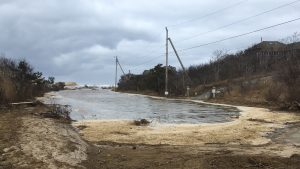Helping Communities Lower the Cost of Flood Insurance
March 2018 -- Three years ago, Woods Hole Sea Grant and its outreach partner the Cape Cod Cooperative Extension developed a first-of-its-kind program for coordinating regional flood insurance and promoting flood resilience in coastal communities. That program is now serving as a model for others across the country.
Federal law requires those with homes in a floodplain and a federally-backed mortgage to carry flood insurance. The National Flood Insurance Program includes a vehicle to provide discounts on the cost of flood insurance called the Community Rating System (CRS) for towns that take steps to improve flood resilience. Those steps can include open space protection, enforcement of the Massachusetts state building code, hazard mitigation planning, GIS data and mapping, public outreach, real estate disclosure of floodplain locations, and stormwater management, among many other activities. But the CRS can be challenging and resource intensive for towns to administer.
In 2015, with flood insurance costs rising and newly-made flood maps adding 8,000 structures to the floodplain, the need for new solutions was clear. In response, Woods Hole Sea Grant provided seed funding to its outreach partner the Cape Cod Cooperative Extension of Barnstable County to hire Shannon Jarbeau as its first county-wide floodplain and CRS coordinator.
“My job is to ease the administrative burden on each individual town and maximize efficient use of resources,” says Jarbeau. Jarbeau shares her expertise with towns throughout the Cape, walking towns through the program, saving time needed to work through and understand the CRS Manual. She guides the town through the application process and remains available for technical assistance and assistance with annual and five-year CRS reviews. She also assists the towns with identifying which actions are worth pursuing for credit, as well as identifying potential future actions that could help continue to improve the community’s flood resilience.
“When I started in this position, four Cape towns were already participating in the CRS program but were in the midst of staffing changes that threatened their participation in the program,” Jarbeau says. She was able to help the towns remain in the program and guided two towns of those towns through their five-year audit cycle. She also helped four new towns join the program and four additional towns through the application process. Currently, 3,000 policyholders in eight towns received a combined $300,000 in annual flood insurance savings.

The regional CRS coordination program created by Woods Hole Sea Grant and the Cape Cod Cooperative Extension of Barnstable County is widely viewed as exemplary for other regions. In May of 2017, the program was recognized for its innovation and success, receiving the James Lee Witt Local Award for Excellence in Floodplain Management. Congressman William Keating recognized the value of the regional coordination for CRS, saying, “The program has worked so well that I introduced the Community Flood Insurance Savings Act to help other regions leverage federal funding and replicate Barnstable County’s success.”
Congressman Keating’s proposed Community Flood Insurance Savings Act of 2017 would enable funding for a regional CRS Coordinator for five years. A second bill was included in the House’s 21st Century Flood Reform Act, which would create a broader CRS position at each FEMA region. The NFIP reauthorization package is still under consideration in Congress.
Looking ahead, Jarbeau says it is likely that two to four more Cape Cod towns will join the CRS program within the next year. This will likely result in savings that are more than triple current savings for the Cape, spreading flood insurance savings to 3,000 – 4,000 more policyholders.


